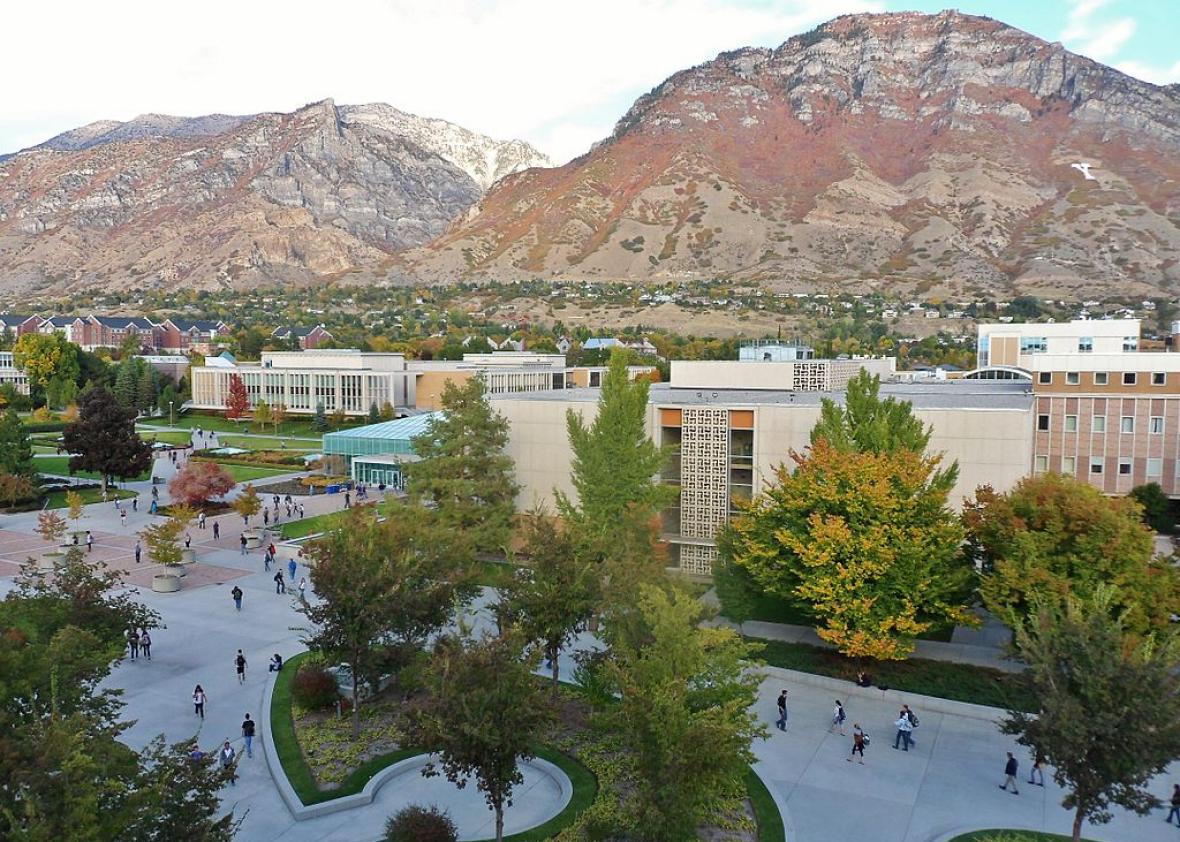At Brigham Young University, if a student reports a rape that happened while she was drinking or breaking curfew, she could end up suspended from the school even if her rapist walks free.
Students and alumni of the private Mormon school in Provo, Utah, are protesting a backward policy that punishes survivors of sexual assault who reach out for support. If, in the investigation of a sexual-assault allegation, university officials find that the alleged victim was breaking the school’s honor code, BYU can punish her, suspend her, or even expel her from school.
Nearly 25,000 people have signed a petition demanding that BYU instate an immunity clause in the honor code—which prohibits consensual sexual activity, alcohol and drug use, and visiting the bedroom of a member of the opposite sex—to protect survivors of sexual violence who report their perpetrators’ crimes.
The petition’s author, Madi Barney, is a BYU undergraduate who says was recently raped in an off-campus apartment. It took her four days to decide to report her rape, she writes, because she was scared of the academic repercussions. She finally came forward to the Provo police; they charged her alleged rapist, who confessed to the crime on a recorded phone call, and are taking him to court.
But two months after Barney made her police report, she was contacted by the school’s Title IX coordinator, who allegedly told her there “wasn’t enough proof of the assault” to qualify her for any special resources. The Honor Code Office then barred her from course registration during an investigation into her behavior.
“I am a survivor of rape, and now BYU has put my academic future on hold due to their allegations that I broke the Honor Code in the circumstances of my assault,” Barney writes in her petition. “I am shocked that [the Title IX coordinator] whose job it is to help victims like me are doubting me and threatening me with retribution. … It’s clear to me that BYU is not on my side.”
It turns out Barney’s alleged rapist had a friend in the sheriff’s department. The Salt Lake Tribune reports that the Honor Code Office began to look into Barney’s violation when a Utah County sheriff’s deputy, the alleged rapist’s buddy, sent BYU a copy of a police file that included “at least 20 pages of detailed statements and a report on [Barney’s] sexual assault medical exam.” Deputy county attorney Craig Johnson, who brought the charges against the alleged rapist, has told BYU officials that they shouldn’t legally have those files. Prosecutors charged the sheriff’s deputy and Barney’s alleged rapist with retaliating against a witness, but those cases were dismissed.
Meanwhile, BYU has refused to postpone its honor code case against Barney while she deals with the criminal case, even though prosecutors have warned the school that it’s putting a criminal prosecution at risk. Barney may have to leave Utah if she can’t stay in school, and prosecutors don’t want her to to be retraumatized by telling the story of her alleged rape over and over to suspicious school officials while the case is pending. Barney’s attorney, Liesel LeCates, told the Tribune that BYU’s lawyers have said its immediate response to Barney’s honor code violation is a matter of complying with federal law. LeCates said that was a gross misinterpretation of Title IX law. “The reason that exists is to keep perpetrators from staying on campus … when criminal proceedings can take years,” she told the Tribune. BYU is “taking that and using it against [a rape survivor].”
Though BYU officials have said that the school’s Title IX coordinator does not report victims to the Honor Code Office, multiple students say they’ve been penalized or expelled for honor code violations after reporting sexual assaults. In her petition, Barney writes that Title IX coordinator Sarah Westerberg recently spoke at a BYU sexual-assault awareness event, saying that the school “does not apologize” for the fact that the honor code may dissuade survivors from reporting rape. Other event attendees confirmed that account on a BYU alumnus’s blog.
BYU’s policy promotes the idea that survivors deserved their sexual victimization by violating the code, enforcing a culture of shame and self-blame. It also protects rapists, who can assault other students with impunity, knowing their victims may be punished if they come forward. It’s the same victim-blaming mechanism that keeps members of marginalized populations, like drug users and sex workers, from reporting sexual assaults to the police for fear of further abuse or legal repercussions. If the school is so worried about enforcing morality in the student body, it should consider how its perverse punishments might embolden the worst offenders on campus.
